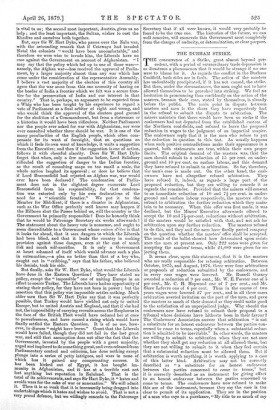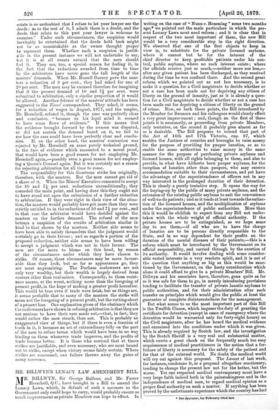THE DURHAM STRIKE.
THE concurrence of a Strike, great almost beyond pre- cedent, with a period of extraordinary trade depression is so disastrous a phenomenon that it would be strange if no one were to blame for it. As regards the conflict in the Durham Coalfield, both sides are in fault. The action of the masters has undoubtedly precipitated, if it has not caused, the strike. But then, under the circumstances, the men ought not to have allowed themselves to be provoked into striking. We feel no hesitation in pronouncing thus confidently on the action of the masters, because their case, stated by themselves, is already before the public. The main point in dispute between masters and men is the share they have respectively had in the refusal to submit the dispute to arbitration. The miners maintain that there would have been no strike if the coalowners had not departed from the established custom of the Northern coal-fields, and refused to leave the proposed reduction in wages to the judgment of an impartial umpire. The coalowners reply that it is the men who refuse to put the reduction in question to this test. As usually happens when such positive contradictions make their appearance in a quarrel, both statements are true, within their own proper limits. The original demand of the masters was, that the men should submit to a reduction of 15 per cent. on under- ground and 10 per cent. on surface labour, and this demand they have refused to submit to arbitration. So far, therefore, the men's case is made out. On the other hand, the coal- owners have not altogether refused arbitration. They have refused it, indeed, as regards a large part of the proposed reduction, but they are willing to concede it as regards the remainder. Provided that the miners will consent to an immediate reduction of 10 and 71 per cent. in under- ground and surface labour respectively, the masters offer to submit to arbitration the further reduction which they main- tain to be necessary. When this offer was first made, it was declined, but the Miners' Executive afterwards offered to accept the 10 and 7-1--per-cent. reductions without arbitration, if the masters would be satisfied with that, and not ask for arbitration upon any further reduction. The masters refused to do this, and they and the men have finally parted company on the question whether the masters' offer shall be accepted. The result of the ballot showed how determined upon resist- ance the men at present are. Only 222 votes were given for accepting the masters' terms, while 21,089 were given for re- jecting them.
It seems clear, upon this statement, that it is the masters who are really responsible for refusing arbitration. Between October, 1875, and August, 1876, there were four arbitrations or proposals of reduction submitted by the coalowners, and in every case wages were lowered. Mr. Russell Gurney awarded a reduction of 9 per cent., Mr. W. E. Forster one of 5 per cent., Mr. C. H. Hopwood one of 7 per cent., and Mr. Shaw Lefevre one of 6 per cent. Thus in the course of two years wages were lowered 27 per cent., and in all these cases arbitration averted irritation on the part of the men, and gave the masters so much of their demand as they could make good to the satisfaction of an unprejudiced judge. Why should the coalowners now have refused to submit their proposal to a tribunal whose decisions have hitherto been in their favour ? The Coalowners' Association answer that arbitration " is not a substitute for an honest endeavour between the parties con- cerned to come to terms, especially when a substantial reduc- tion is admitted to be inevitable." In other words, the masters are willing to submit to arbitration when they are not sure whether they shall get any reduction at all allowed them, but they are not willing to submit to it when they feel certain that a substantial reduction must be allowed them. But if arbitration is worth anything, it is worth applying to a case of this latter kind. Arbitration may not be correctly described as " a substitute for an honest endeavour between the parties concerned to come to terms," but it is correctly described as an instrument for giving effect
to an honest endeavour between the parties concerned to come to terms. The coalowners have now refused to make this use of the instrument, because they say the case is too clear to permit of its application. They are in the position of a man who says to a purchaser, "My title to so much of my estate is so undoubted that I refuse to let your lawyer see the deeds ; as to the rest of it, I admit there is a doubt, and the deeds that relate to this part your lawyer is welcome to examine." Under such circumstances, the suspicion would inevitably be entertained that the deeds held back might not be so unmistakable as the owner thought proper to represent them. Whether such a suspicion is justifi- a'31e in the present instance we will not undertake to say, bat it is at all events natural that the men should feel it. They see, too, a special reason for feeling it, in the fact that the reductions awarded from time to time by the arbitrators have never gone the full length of the masters' demands. When Mr. Russell Gurney gave the mas- ters a reduction of 9 per cent., they had asked for one of 20 per cent. The men may be excused therefore for imagining that if the present demand of 10 and 74 per cent. were submitted to arbitration, only a similar proportion of it would be allowed. Another defence of the masters' attitude has been suggested to the Times' correspondent. They asked, it seems, for a reduction of wages in August, 1877, and the umpire, Mr. Herschell, refused it, though the case was perfectly clear and conclusive, " because to his legal mind it seemed to have some flaws of evidence." If this means that the evidence brought forward by the owners was disputed, or did not sustain the demand based on it, we fail to see how the case could have been perfectly clear and conclu- sive. If, on the other hand, the masters' contention was rejected by Mr. Herschell on some purely technical ground, in the face of evidence which amounted to a moral proof, that would have been a good reason for not employing Mr. Herschell again,—possibly even a good reason for not employ- ing a Queen's Counsel again. But it was certainly not a reason for rejecting arbitration for all time to come.
The responsibility for this disastrous strike lies originally, therefore, with the masters. But the men cannot get rid of a share of it. When the Miners' Executive consented to accept the 10 and 74 per cent. reductions unconditionally, they conceded the main point, and having done this they ought not to have stood out upon the submission of a further reduction to arbitration. If they were right in their view of the situa- tion, the masters would probably have got more than they were strictly entitled to in the reductions of 10 and 74 per cent., and in that case the arbitrator would have decided against the masters on the further demand. The refusal of the men betrays a suspicion of the results of arbitration similar in kind to that shown by the masters. Neither side seems to have been able to satisfy themselves that the judgment would certainly go in their favour ; and as regards a portion of the proposed reduction, neither side seems to have been willing to accept a judgment which was not in their favour. The men are the more to blame on this head, by reason of the circumstances under which they have chosen to strike. Of course, these circumstances may be more favour- able than they look, but as far as appearances go, they are most unpromising. The Durham coalowners are not only very wealthy, but their wealth is largely derived from sources other than coal-mines. Consequently, to them resist- ance means, at the worst, nothing more than the foregoing of present profit, in the hope of making a greater profit hereafter. This would be true even if trade were brisk, but as things are, it seems probable that to many of the masters the strike will mean not the foregoing of a present profit, but the cutting-short of a present loss. One explanation given of the obstinacy which the coalowners have shown in refusing arbitration is that they are not anxious to have their case made out,—that, in fact, they would rather the men struck, than not. This is probably an exaggerated view of things, but if there is even a fraction of truth in it, it becomes an act of extraordinary folly on the part of the men to refuse terms which would have been in no way binding on them whenever trade improves, and the profits of trade become better. It is those who contend that at times strikes are justifiable, and even necessary, who are most bound not to strike, except when victory seems fairly certain. Where strikes are concerned, one failure throws away the gains of many successes.



































 Previous page
Previous page